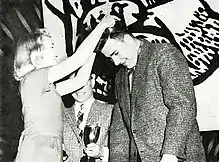
An ugly man contest is a competition which inverts the concept of a beauty contest by having men compete for the title of ugliest. Such contests were usually done in jest, and votes were more reflective of popularity rather than actual physical unattractiveness.[1][2] The contests were used as a fundraising vehicle, charging money for each vote cast.
In Australia, a 1917 ugly man competition led to the formation of the Ugly Men's Voluntary Worker's Association of Western Australia Inc., a grassroots charitable organization which raised funds to help soldiers and their families in the aftermath of World War I.[3]
Ugly man contests were a feature of box suppers (and similar events, such as pie suppers or ice cream suppers) in the United States, often coinciding with a parallel "pretty girl" contest.[1][4]
Ugly man contests were regularly held on college campuses in the United States by fraternities, including Alpha Phi Omega, the largest fraternity in the United States. The APO tradition began at Georgia Tech, and by 1953 had spread to nearly every chapter in the country.[5] In April 1991, a fraternity at George Mason University held an "ugly woman" contest, in which 18 fraternity members dressed in drag, with one also donning blackface. The incident caused controversy on campus, and led the dean to suspend the fraternity for two years, though this punishment was later overturned by a federal judge on First Amendment grounds.[6]
References
- 1 2 "Stories From the Past - Old Fashioned Box Suppers". Overton County News. 19 October 2021.
- ↑ Parnass, Sarah (28 October 2009). "Giving back: old-school style". The Eagle.
- ↑ van Teeseling, Ingeborg (22 December 2019). "The papers called their fundraising a "moral disgrace", but the Ugly Men saved Australia's poor from hopelessness". The Big Smoke.
- ↑ Montell, William Lynwood (2011). Tales from Kentucky One-room School Teachers. University Press of Kentucky. p. 196. ISBN 9780813129792.
- ↑ "Who's the Ugliest Man?". Boys' Life: 30. October 1953.
- ↑ Depalma, Anthony (29 August 1991). "U.S. JUDGE UPHOLDS SPEECH ON CAMPUS". New York Times.